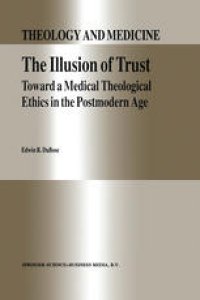
Ebook: The Illusion of Trust: Toward a Medical Theological Ethics in the Postmodern Age
Author: Edwin R. DuBose (auth.)
- Tags: Ethics, Theory of Medicine/Bioethics, Religious Studies, Philosophy of Medicine
- Series: Theology and Medicine 5
- Year: 1995
- Publisher: Springer Netherlands
- Edition: 1
- Language: English
- pdf
This book is about trust and its implications for a medical theological ethics. Beginning with its earliest work, there has been attention to trust running through the bioethics literature in the United States, and much of this discussion has examined its theological elements. Clearly, trust is indispensable when describing the patient-physician relationship, so why is there a need for yet another study? There is no doubt that people generally trust physicians. Traditionally the physician is the patient's fiduciary agent, whose sole obligation is to act only in the patient's best interest. In recent times, however, there is a perception on the part of people within and without health care that physicians have other obligations that compete with their obligation to the patient. If we acknowledge that one price for the successes of technological biomedicine is high in terms of financial cost, another price of Sllccess seems to be distrust, cynicism, and suspicion directed by the public toward the medical profes sion. If this uneasiness is the price society pays for medical success, what is the price of success for the doctor? Because of their role within the social order, physicians have claimed and been granted autonomy, authority, and special status. In return, the profes sion has pledged to serve the well-being and interests of humankind. This fiduciary commitment becomes a taken-for-granted aspect of the physician's identity, both for the physician for whom this dedication is definitional and for the public which expects trustworthy service from this person.
The vulnerability of the ill highlights the importance of trust in physician--patient relationships. Previous work in theological ethics on the fiduciary principle or the virtue of trust has not fully appreciated the effect on relations between physicians and patients of a professional and organizational frame of reference grounded in the image of the physician as keeper of knowledge and expertise. In recent years, these relationships have been characterized by an economy of domination in which the physician or patient secures his or her autonomy at the expense of the other; trust becomes a commodity bartered between self-interested parties. As a result, the profession's traditional declaration of a commitment to the patient's interests is becoming illusory. If God is envisioned as a presence enriched by relationship with humans, trust-as-faith or a commitment to trust in spite of our vulnerability becomes the basis for social relationships of mutual dependency and a model for the physician--patient relationship.
The book will be of interest to moral philosophers, physicians, religious ethicists, and theologians. It is suitable for use as a textbook and as supplementary reading in graduate courses in philosophy of medicine, theological ethics, and medical ethics.